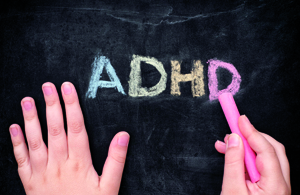Learn how to manage your child's ADHD
10/13/2025 by Renee Breland, APRN, C.N.P., M.D.

While most children occasionally struggle with paying attention, managing impulses and emotions, or navigating social situations, these challenges are more frequent and pronounced in children with attention deficit hyperactivity disorder (ADHD). As a result, they can experience significant difficulties at home, in school, and in their relationships.
ADHD is a neurobehavioral condition that impacts how the brain affects learning, behavior and emotions. Essentially, the symptoms occur because your child's brain works uniquely to take in, learn and process information. Your child is not lazy. This was not caused by bad behavior or bad parenting. ADHD does not affect intelligence, but it can affect grades and school success.
Along with poor school performance, children with ADHD may struggle with low self-esteem, troubled relationships and school anxiety. ADHD symptoms sometimes lessen with age. While some people never completely outgrow ADHD, they can learn strategies to be successful.
While treatment won't cure ADHD, it can help a great deal with symptoms. Treatment typically involves medications and behavioral interventions. Early diagnosis and treatment can make a big difference in the outcome for your child.
These behavioral strategies can help you manage your child's ADHD:
Praise and reward your child when rules are followed. Children with ADHD often receive and expect more criticism than other children. This can really affect their self-esteem. Some days, you might have to look hard for good behavior, but you should praise good behavior at least five times more often than you criticize bad behavior.
Give clear, effective directions or commands. Make eye contact or gently touch your child's arm or shoulder to get their attention. Give brief, simple steps and short commands that get to the point rather than multiple directions or wordy statements/questions.
Establish healthy habits. If your child is on medication, it should be taken as prescribed. Contact your child's healthcare clinician if problems arise. Make sure your child is getting enough sleep, eating a well-balanced diet consisting of three meals, a snack and adequate fluid every day, and participating in some form of daily exercise. These healthy habits will help your child feel their best and minimize ADHD symptoms.
Develop routines around homework and chores.
- Work together to make a checklist of what needs to be done for daily chores, getting ready for bed and school, so your child has something to refer to when they get off task.
- Encourage your child to use a daily planner so they're aware of all homework assignments.
- Have an established time and location for homework and use a timer to remind your child two to four times an hour to show you their progress on the work.
- Factor in brain breaks if your child needs them. Add movement between tasks or let them use an appropriate fidget toy.
- Help your child build relationships, develop strong social skills and maintain friendships.
- Be a good role model for the behavior you want your child to practice.
To help maintain a strong parent-child relationship, set aside some special time with your child three to five days a week. Make sure this time doesn't involve a screen and that it's conflict-free.
Help your child develop at least one close friendship. With younger children, parents may need to take the lead in arranging and hosting play dates or getting kids involved in activities with other children of the same age.
Renee Breland, APRN, C.N.P., M.S., is a certified pediatric nurse practitioner with a pediatric mental health certification in Primary Care in Rochester and Kasson's Integrated Community Specialty Pediatric ADHD Clinic. She also provides general pediatric primary care at Mayo Family Clinic Northeast in Rochester, Minn.
